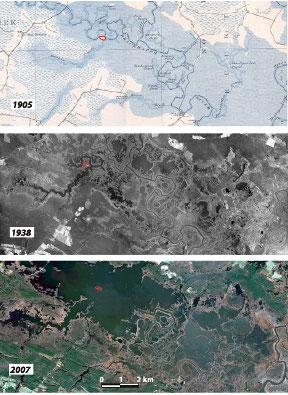Past and present sea levels in the Chesapeake Bay Region, USA

This is a time series of the Blackwater River valley. Top: Intact marsh surveyed from AD 1902 to AD 1904 and presented in a 7.5" USGS topographic map from AD 1905; dark blue hatching around the Blackwater valley is tidal marsh; light blue pattern is freshwater swamp. Middle: Initiation of major ponding seen in an aerial photograph from AD 1938. Bottom: Coalesced ponds forming the informal 'Lake Blackwater' in satellite imagery from AD 2007. Credit: GSA Today, DeJong et al., and credits within the caption
In a new article for GSA Today, authors Benjamin DeJong and colleagues write that sea-level rise (3.4 mm/yr) is faster in the Chesapeake Bay region than any other location on the Atlantic coast of North America, and twice the global average (1.7 mm/yr). They have found that dated interglacial deposits suggest that relative sea levels in the Chesapeake Bay region deviate from global trends over a range of timescales.
According to DeJong and colleagues, “Glacio-isostatic adjustment of the land surface from loading and unloading of continental ice is likely responsible for these deviations, but our understanding of the scale and timeframe over which isostatic response operates in this region remains incomplete because dated sea-level proxies are mostly limited to the Holocene and to deposits 80 ka or older.”
To better understand glacio-isostatic control over past and present relative sea level, DeJong and colleagues applied a suite of dating methods to the stratigraphy of the Blackwater National Wildlife Refuge, one of the most rapidly subsiding and lowest-elevation surfaces bordering Chesapeake Bay. Their data indicate that the region was submerged at least for portions of marine isotope stage (MIS) 3 (about 30 to 60 thousand years ago), although, they note, multiple proxies suggest that global sea level was 40 to 80 meters lower than today.
Today, MIS 3 deposits are above sea level because they were raised by the Last Glacial Maximum forebulge, but decay of that same forebulge is causing ongoing subsidence. “These results,” they write, “suggest that glacio-isostasy controlled relative sea level in the mid-Atlantic region for tens of thousands of years following retreat of the Laurentide Ice Sheet and continues to influence relative sea level in the region.”
The study finds that isostatically driven subsidence of the Chesapeake Bay region will continue for millennia, exacerbating the effects of global sea-level rise and impacting the region's large population centers and valuable coastal natural resources.
###
For more information, see the University of Vermont's press release, “Washington, D.C., Sinking Fast, Adding to Threat of Sea-Level Rise.” http://www.
ARTICLE
Pleistocene relative sea levels in the Chesapeake Bay region and their implications for the next century Benjamin D. DeJong, Paul R. Bierman, Wayne L. Newell, Tammy M. Rittenour, Shannon A. Mahan, Greg Balco, and Dylan H. Rood. Pages 4-10; doi: 10.1130/GSATG223A.1.
GSA Today articles are open access online; for a print copy, please contact Kea Giles. Please discuss articles of interest with the authors before publishing stories on their work, and please make reference to GSA Today in articles published.
Contact: Kea Giles
+1-303-357-1057
kgiles@geosociety.org
Media Contact
All latest news from the category: Earth Sciences
Earth Sciences (also referred to as Geosciences), which deals with basic issues surrounding our planet, plays a vital role in the area of energy and raw materials supply.
Earth Sciences comprises subjects such as geology, geography, geological informatics, paleontology, mineralogy, petrography, crystallography, geophysics, geodesy, glaciology, cartography, photogrammetry, meteorology and seismology, early-warning systems, earthquake research and polar research.
Newest articles

A new puzzle piece for string theory research
Dr. Ksenia Fedosova from the Cluster of Excellence Mathematics Münster, along with an international research team, has proven a conjecture in string theory that physicists had proposed regarding certain equations….

Climate change can cause stress in herring larvae
The occurrence of multiple stressors undermines the acclimatisation strategies of juvenile herring: If larvae are exposed to several stress factors at the same time, their ability to respond to these…

Making high-yielding rice affordable and sustainable
Plant biologists show how two genes work together to trigger embryo formation in rice. Rice is a staple food crop for more than half the world’s population, but most farmers…



